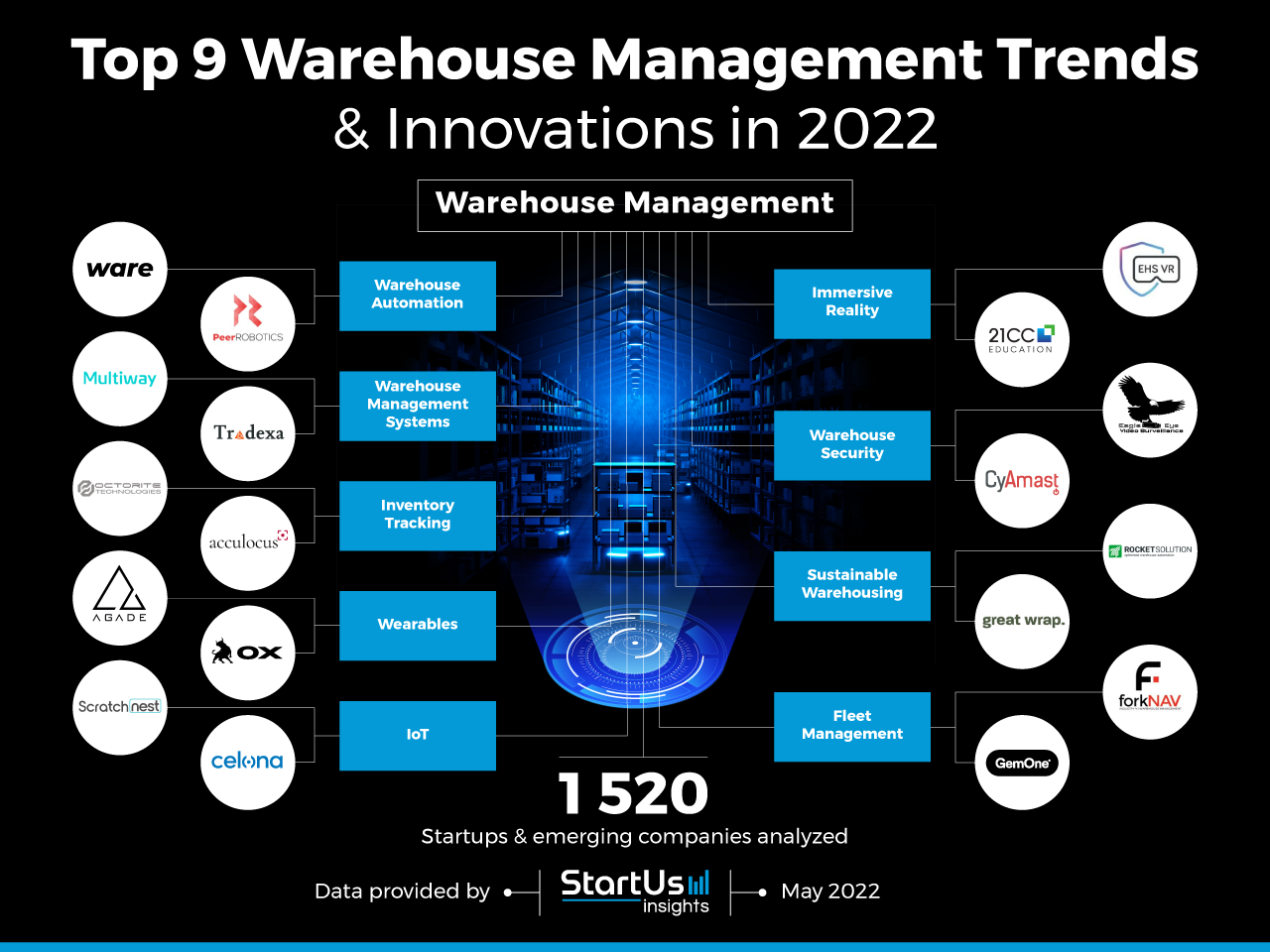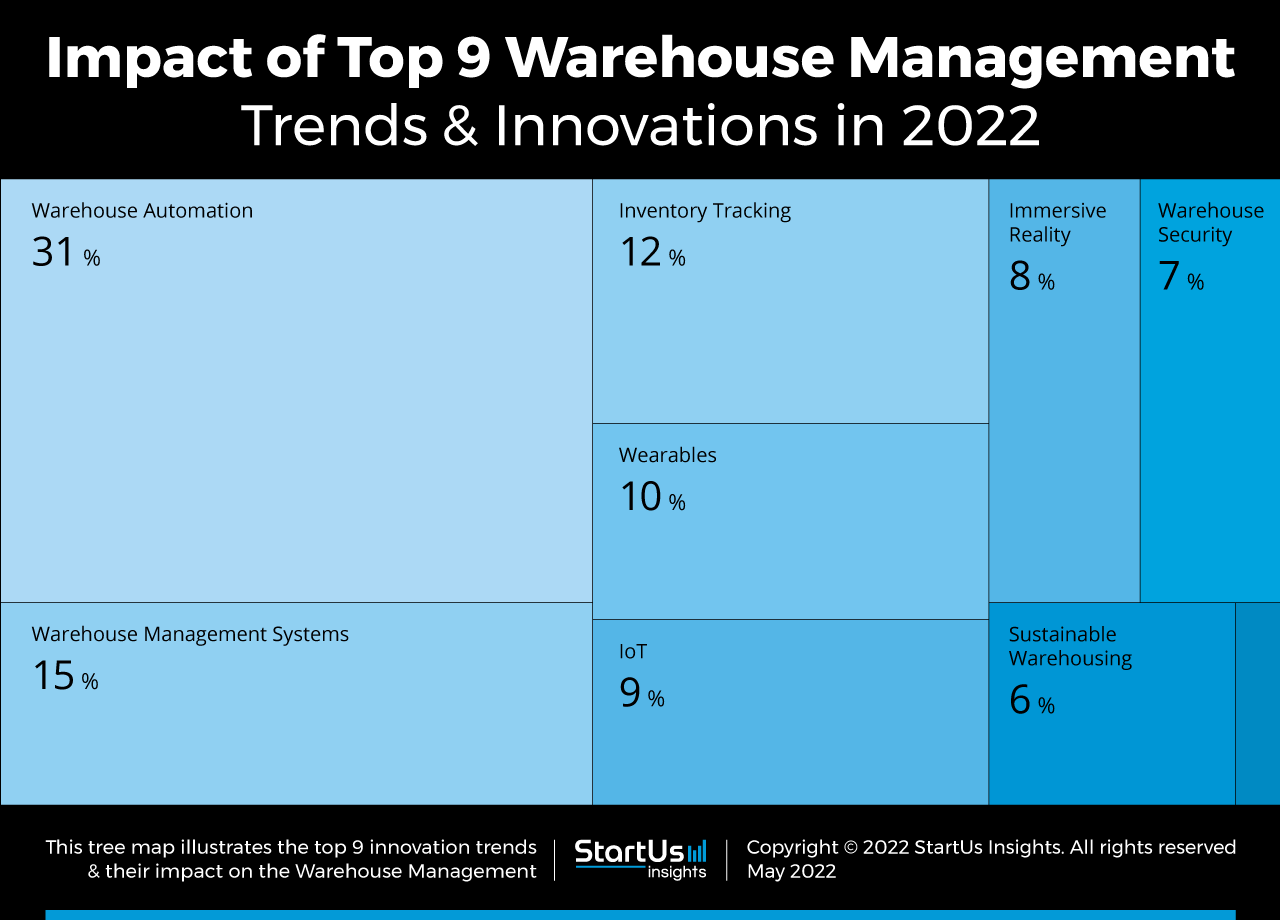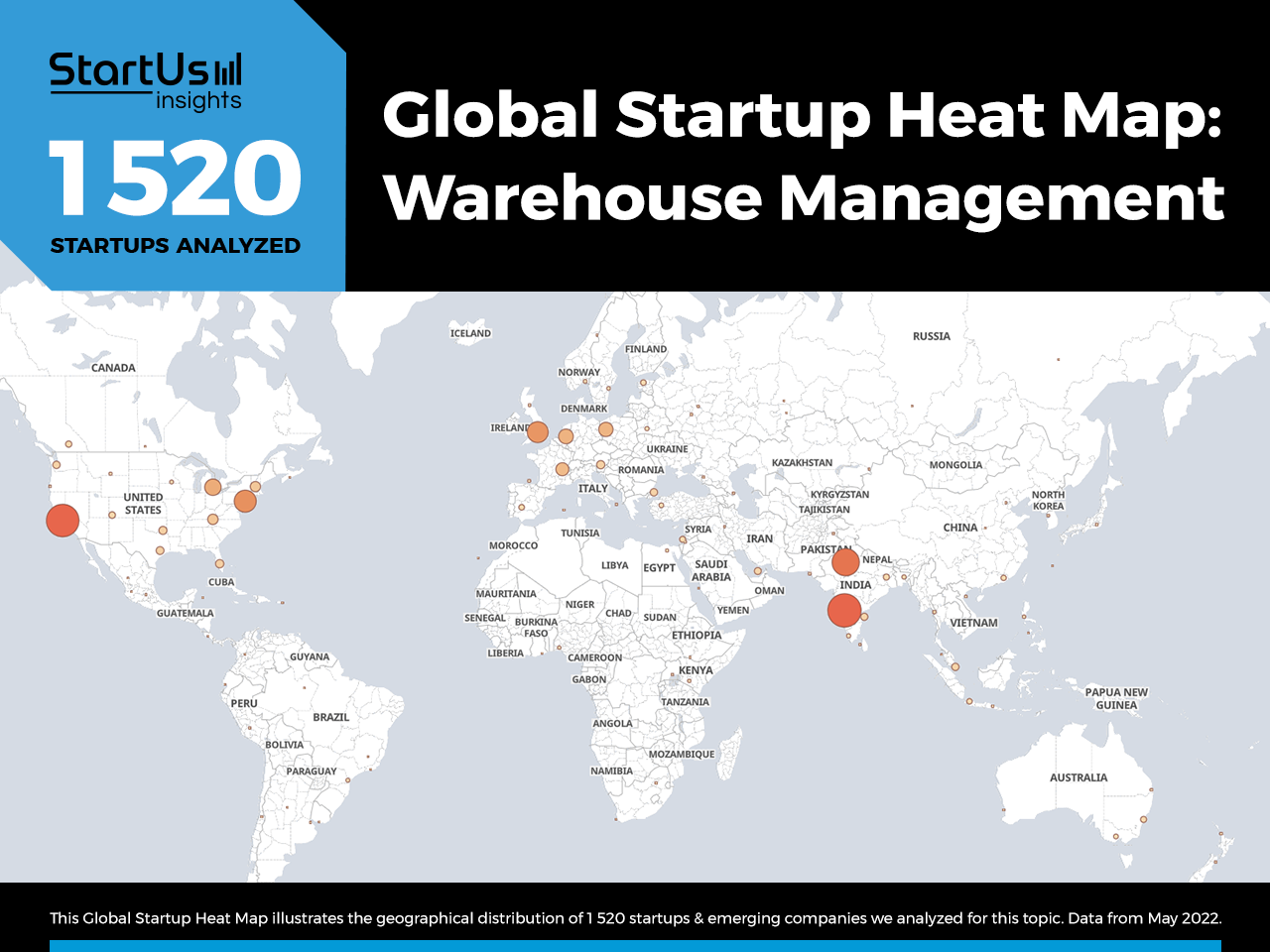Accelerate Productivity in 2025
Reignite Growth Despite the Global Slowdown
The latest trends in warehouse management include robotics, inventory transportation, fleet management, and the Internet of Things (IoT). Digital automation replaces manual work and reduces human involvement in hazardous tasks, thus enhancing safety and lowering operating expenses. The industry also integrates sustainability by adopting green processes and eco-friendly materials to ensure environmentally responsible operations. These advances optimize warehouse efficiency, safety, and sustainability, aligning with current market demands for innovation and eco-conscious practices.
This article was last updated in August 2024.
Top 9 Warehouse Management Trends in 2025
- Warehouse Automation
- Warehouse Management Systems
- Inventory Tracking
- Wearables
- Internet of Things
- Immersive Reality
- Warehouse Security
- Sustainable Warehousing
- Fleet Management
Innovation Map outlines the Latest Trends in Warehouse Management & 18 Promising Startups
For this in-depth research on the top warehouse management trends and startups, we analyzed a sample of 1520 global startups & scaleups. This data-driven research provides innovation intelligence that helps you improve strategic decision-making by giving you an overview of emerging technologies in the warehousing industry. In the Warehouse Management Innovation Map below, you get a comprehensive overview of the innovation trends & startups that impact your company.
These insights are derived by working with our Big Data & Artificial Intelligence-powered StartUs Insights Discovery Platform, covering 4.7M+ startups & scaleups globally. As the world’s largest resource for data on emerging companies, the SaaS platform enables you to identify relevant technologies and industry trends quickly & exhaustively.
Want to explore all warehouse management innovations & trends?
Tree Map reveals the Impact of the Latest Trends in Warehouse Management
Based on the Innovation Map, the Tree Map below illustrates the Top 9 Warehousing Trends impacting the industry in 2025. To advance warehouse automation, startups are developing solutions to increase storehouse speed, improve space utilization, and improve ergonomics. These reduce costs, optimize space, enhance workforce safety, and process sustainability. One of the emerging trends in warehouse management is delegating manual, labor-intensive, or dangerous tasks to robots.
Warehouse management systems automate the supply chain processes, offering full control of the organization. Inventory transportation reduces labor costs and minimizes inventory errors. Startups are also designing wearables to increase labor management and maintain workforce safety. Immersive reality enhances warehouse employees’ training and onboarding processes. To reduce its carbon footprint, the industry is developing and adopting sustainable innovations.
Global Startup Heat Map covers 1520 Warehouse Management Startups & Scaleups
The Global Startup Heat Map below highlights the global distribution of the 1500+ exemplary startups & scaleups that we analyzed for this research. Created through the StartUs Insights Discovery Platform, the Heat Map reveals that the US and India see the most startup activity in the industry.
Below, you get to meet 18 out of these 1520 promising startups & scaleups as well as the solutions they develop. These 18 warehouse innovations are hand-picked based on criteria such as founding year, location, funding raised, and more. Depending on your specific needs, your top picks might look entirely different.
Top 9 Trends in Warehouse Management (2025)
1. Warehouse Automation
Warehouse operations are traditionally labor-intensive. Startups leverage advanced robotics to reduce manual processes in warehousing. By integrating automated guided vehicles and autonomous mobile robots, warehouses lower the need for labor in handling materials. This avoids human errors and improves the safety of both workers and inventory safety.
Warehouse robotics automate inventory picking, palletizing, transportation, and inspection. Cobots, drones, goods-to-person robots, and driverless forklifts are some kinds of robots that enable operations automation in warehouses. This top trend is also part of the emerging warehouse automation trends.
Ware manufactures Autonomous Drones
US-based startup Ware develops autonomous drones that fly within warehouses. The smart drones use indoor geolocation technology, AI to avoid obstacles, and a 2D scanner to capture images of the inventory, creating a digital twin of the warehouse. The scanned barcodes and product location data are stored in the cloud for inventory analysis. By digitizing the facility using smart drones, the startup’s solution speeds up warehouse product recording.
Peer Robotics develops Collaborative Mobile Robots
US-based startup Peer Robotics develops collaborative mobile robots that learn from human operators. Using sensing technologies, the startup’s cobots understand human intentions through gestures, commands, and physical interaction. The robots enable material handling and movement in close and clustered environments. Additionally, Peer Robotics’ cobots enable the digital transformation of the warehouse via automated inventory tracking.
2. Warehouse Management Systems
Tracking, storing, and transporting inventory is a collaborative process that involves different parties. It is difficult to visualize changes in real-time as everyone works on their own tasks. Warehouse management systems reduce the complexity of warehouse operations. These allow warehouse managers to control and administer operations from the time goods or materials enter a storehouse until they move out. These solutions use big data and AI technologies to provide warehouse analytics for performance tracking and process optimization.
Multiway enables Warehouse Process Control
Chinese startup Multiway offers a warehouse management system for warehouse process control. Through this system, warehouse managers visualize warehouse processes, operations status, and manage stock keeping. Additionally, the system includes customer site management and provides customer efficiency improvement analysis. Multiway warehouse management allows warehouse managers to control processes in one place, thereby reducing the likelihood of making mistakes when controlling a larger volume of tasks.
Tradexa enables Warehouse Inventory Management
Indian startup Tradexa offers warehouse inventory management software. The startup’s Hyper Inventory system acts as a command center to manage warehouse activities at multiple warehouses at once. It facilitates price, inventory, delivery, and reputation control across all channels. In addition, using AI-based business intelligence, it provides inventory forecasting, product and buyer performance, as well as financial analytics.
3. Inventory Tracking
With a large number of items moving in and out, warehouse managers need to track all goods to avoid inventory loss due to spoilage, damage, or theft. Inventory tracking solutions eliminate the possibility of human errors and provide transparency in the supply chain.
Advanced technology such as Radio Frequency Identification (RFID), a radio wave-based technology, avoids the limitation of barcoding as the tags can be detected and read remotely and simultaneously. OCR technology speeds up warehouse processes by creating a digital version of a printed, typewritten, or handwritten document for a quick addition to a database.
Octorite Technologies offers an RFID Scanning System
Indian startup Octorite Technologies develops a tunnel-based RFID scanning system that uses its proprietary antennas. The system automatically starts the reading procedure with the use of sensors when a trolley or a pallet is in the correct position. Additionally, the startup develops an iTrack software system that communicates to the RFID hardware and reads 1000 tags per second. OCTORITE enables warehouses to automate and proceed with the high number of tag scanning faster.
Fiber builds an Inventory Management App for SMEs
Nigerian startup Fiber offers a free inventory management app that allows small businesses to easily track inventory levels, record sales, and print receipts from any device. It keeps accurate records of stock quantities and expiry dates as well as sales, payments, debts, and refunds. Businesses use the app to detect potential issues like inventory manipulation and review bank transfers. It allows for creating staff accounts so that multiple employees can sell directly from their mobile devices. Fiber simplifies record-keeping for small businesses through its mobile app and web interfaces.
4. Wearables
Warehouse operators work in fast, decentralized environments under time-sensitive schedules trying to perform tasks efficiently. To achieve this, employees need to freely move around without any constraints. Wearable technologies offer hands-free mobility as well as provide in-depth information about items around in a warehouse. Wearables such as smart glasses and intelligent gloves improve worker productivity by allowing them to perform steps with the correct posture.
AGADE manufactures Exoskeletons
Italian startup AGADE develops exoskeletons to assist operators during manual material handling. With the use of its patented technology, the exoskeletons adapt automatically to physical effort compensation with respect to the user’s movements and payloads. It adapts the muscular stress relief with respect to the user’s movements and recognizes the presence of a payload picked by the user. This way, it enables warehouse employees to deal with heavy inventory up to 25 kg without load on the spine.
Ox advances Smart Glasses
US-based startup Ox designs smart glasses equipped with machine learning and AR technology. It uses batching and pickwalk optimization technology to enable warehouse employees to pick inventory more accurately and efficiently. The startup’s glasses feature inbuilt scanners, eliminating the need to juggle bulky scanners, as well as real-time messaging, facilitating communication between coworkers. This way, Ox’s wearable automates warehouse workforce and pick routing to maximize units picked per hour.
Find out how 10 emerging technologies shape your industry!
5. Internet of Things
Warehousing startups are developing IoT solutions to control and optimize processes. Connected sensors track assets across the storehouse and monitor temperature, moisture, lighting, and other conditions. IoT enables inventory management and analytics by leveraging real-time data from beacons. Smart shelves broadcast stock information and determine when the products need to be replaced.
Another implementation of IoT technology in warehouses, digital twins extract data from the warehouse network and warehouse management systems to create a real-time model of the warehouse. These enable warehouse managers to visualize operations, search inventory, or simulate changes to layout and workflow.
ScratchNest manufactures Tracking Beacons
Indian startup ScratchNest provides a compact IoT beacon with a long battery life for user location tracking. Equipped with Bluetooth low energy (BLE) technology, the wireless transmitter sends signals to smartphones or tablets, making it easier for operators to track the location of both inventory and personnel.
Celona offers 5G Local Area Network (LAN) Connectivity
US-based startup Celona develops an end-to-end 5G LAN solution. The startup offers a private 5G network setup that meets the connectivity needs for warehouse automation. This provides connectivity solutions for autonomous robots and vehicles that require real-time computing and reduces operating costs by increasing uptime.
6. Immersive Tech
Fast delivery of the right products to the right destination within a warehouse depends not just on the equipment but also on personnel skills. To maintain employees’ efficiency at the highest levels, warehouses are integrating immersive reality solutions. Virtual and augmented reality (VR/AR) simplify the implementation of new procedures, warehouse expansion planning, predictive modeling, and designing delivery processes.
Virtual reality enhances employee skills with immersive training in warehouse tasks. Augmented reality finds use in the process of searching for a product, showing the optimal route to the item. Immersive reality technologies improve decision-making processes through operations visualization.
EHS VR develops VR Forklift Training
UK-based startup EHS VR develops a platform for warehouse employee training. It provides VR-based forklift training to prepare warehouse personnel to work with forklifts. It monitors and reports the progress of employees during the training. The solution provides personalized training that is not restricted by the availability of free equipment.
FlashQ creates Novel Virtual Waiting AI for Trucking and Logistics
Canadian startup FlashQ develops virtual waiting AI that helps trucks avoid congestion by allowing them to wait remotely at logistics facilities. By enabling remote waiting, FlashQ potentially saves significant costs annually in fuel and penalty fees while also reducing pollution. FlashQ presents an innovative solution that delivers significant economic and environmental benefits for the trucking industry.
7. Warehouse Security
Since warehouses store valuable inventory, they are an attractive place for thieves. Therefore warehouse security is increasingly a priority for warehousing companies. Warehouses integrate alarm systems, video surveillance cameras, smart locks, and broken glass detectors to store valuable aspects of their business safely. Additionally, warehouses are moving to the cloud and transmitting data across widely dispersed networks.
To address the risk of data fraud, warehousing cybersecurity solutions ensure data protection. For instance, blockchain technology makes operations and transactions along the supply chain more transparent and traceable. Cyber risk management systems enable warehouses to assess the risk as well as remediate any security gaps.
Eagle Eye Video Surveillance manufactures Warehouse Security Cameras
US-based startup Eagle Eye Video Surveillance produces warehouse security cameras that prevent burglaries and thefts by ensuring round-the-clock monitoring of the storage facility. The startup develops a power-over ethernet system for security cameras, from which they get power as well as transmit video through one ethernet cable. This allows broadcasting live video to multiple warehouse locations with a high resolution, monitoring automatic processes and equipment, and making sure it is functioning properly and safely.
CyAmast provides Warehouse Network Security
Australian startup CyAmast offers an IoT cybersecurity solution that improves warehouse network security. Its proprietary network device mapping and monitoring technology provides detailed information about any data that is used in the company and to which it was accessed. It enables warehouse managers to see in near real-time any anomalous network activity that may indicate a malfunction or possible security compromise. CyAmast provides visibility of the warehouse devices’ behavior, allowing storehouse employees to respond to inefficient occurrences.
8. Sustainable Warehousing
As warehouses produce tonnes of waste during operations, minimizing the environmental impact is at the heart of the sustainable warehousing trend. To move towards green warehousing and curb the carbon footprint, startups are using automated handling in the operational processes. Such equipment emits fewer emissions and is able to operate without lighting, reducing energy consumption.
By reducing, reusing, or recycling warehouse equipment, such as plastic containers, pallets, and packaging, warehouses minimize their waste. To sum up, the green warehousing trend advances efficient energy and resource usage to limit the industry’s impact on climate.
Rocket Solution offers Sustainable Warehouse Storage
German startup Rocket Solution develops sustainable warehouse storage. Using shuttle technology optimizes warehouse capacity with minimum space requirements. Moreover, it scales to meet the requirements of the warehouse, serving big warehouses and microhubs as well as adopting for short-term demands. It combines IoT and cloud computing to enable app-based warehouse monitoring. The startup’s storage system uses durable components and materials, local production sites, and low energy consumption, thereby improving sustainability.
Great Wrap offers Compostable Pallet Wraps
Australian startup Great Wrap offers sustainable packaging solutions for pallets. The startup converts food waste into home compostable pallet wraps and caps, providing an eco-friendly alternative that performs like petroleum-based pallet wraps. The compostable packaging breaks down into carbon and water in a matter of weeks, leaving no toxins behind. Great Wrap’s solution decarbonizes packaging operations in warehouses.
9. Fleet Management
Efficient and safe interaction between equipment and workers contributes to productivity and prevents hazards. Fleet management optimizes warehouse layout, minimizes forklift accidents, provides real-time asset monitoring, and enhances drivers’ safety and health. A fleet increasingly features diverse warehouse vehicles such as hand trucks, AGVs, conveyor belts, forklifts, and mobile robots.
When physical activities are replaced by vehicles and robots, a fleet management system is a solution that is capable of collating all types and brands of robots and forklifts onto one platform. It enables traffic control, empowers interoperability, and facilitates automated task allocation, providing full control of the machinery.
forkNAV provides Forklift Operation Optimization
Latvian startup forkNAV offers forklift management software that organizes and optimizes the forklifts’ work in warehouses. It saves forklift operators time on finding items, shipping, and work orders on paper. The solution eliminates the need for an extra tagging or labeling system and provides automatic work order distribution, enabling automation. Further, it provides inventory tracking and analyzes forklift utilization for process improvement.
GemOne offers a Telematics System
Belgian startup GemOne develops Onyx, a telematics system for tracking vehicles and machinery. It monitors a wide range of data and information about machinery, vehicles, and tools in the warehouse, using dust- and water-resistant Onyx hardware. The solution stores the data on a cloud platform that translates it into actionable insights. Onyx enables real-time monitoring of the fleet and recommends improvements to improve operational efficiency, extending the life of the equipment.
Discover all Warehouse Management Trends, Technologies & Startups
Emerging warehousing trends significantly improve operational efficiency and decision-making. In addition to risk prevention and safe labor management, innovative solutions are enabling the transition to sustainable processes in warehouses. As warehouse operations become more complex, advanced robots are adapting to the ongoing changes while becoming more worker-friendly.
The warehouse innovations startups outlined in this report only scratch the surface of trends that we identified during our data-driven innovation & startup scouting process. Identifying new opportunities & emerging technologies to implement into your business goes a long way in gaining a competitive advantage.


 WATCH THE VIDEO VERSION
WATCH THE VIDEO VERSION 









